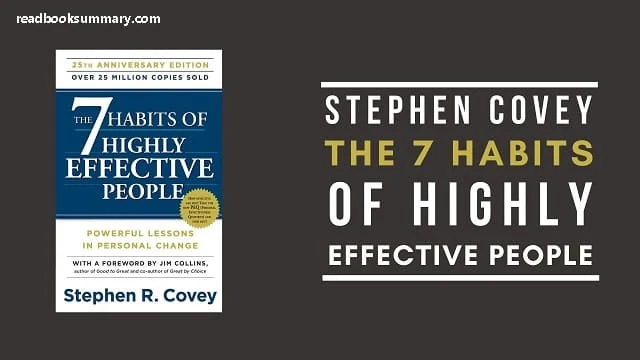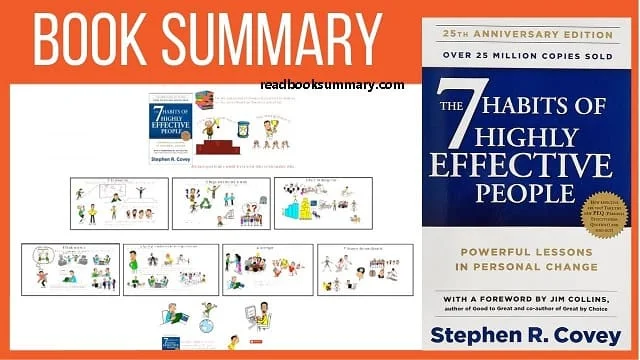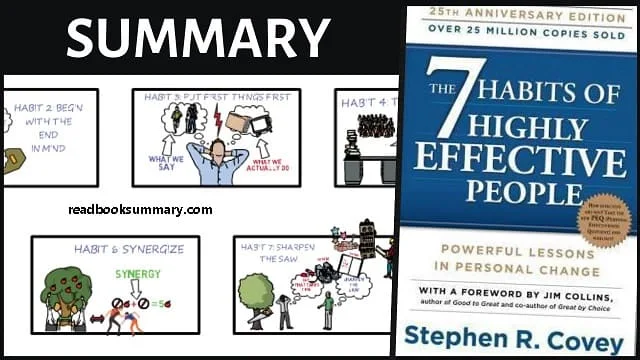The 7 Habits of Highly Effective People Summary. first published in 1989, it is a business and self-help book written by Stephen R. Covey. Covey presents an approach to being effective in attaining goals by aligning oneself to what he calls "true north" principles based on a character ethic that he presents as universal and timeless.
Covey defines effectiveness as the balance of obtaining desirable results with caring for that which produces those results. He illustrates this by referring to the fable of the goose that laid the golden eggs. He further claims that effectiveness can be expressed in terms of the P/PC ratio, where P refers to getting desired results and PC is caring for that which produces the results.
 |
| The 7 Habits of Highly Effective People Summary |
The 7 Habits of Highly Effective People Summary
HABIT 1: BE PROACTIVE: This essentially means to take full responsibility for your lives and choices. To be proactive, you should take the initiative, choose proactive language and focus on your Circle of Influence.
HABIT 2: BEGIN WITH THE END IN MIND: This is the habit of personal leadership. It is about having a clear vision in your mind on your end destination and goals. This is important because everything happens first in your mind before becoming reality in the physical form. To get started, you’ll need to start by examining your center and developing your personal mission statement.
HABIT 3: PUT FIRST THINGS FIRST: With clear priorities identified and created mentally (Habit 2) , you move into the habit of personal-management. This is where you exercise willpower and discipline, to organise and implement activities that translate your goals into reality. Covey shares the time-management matrix and hhow to effectively manage your time using 6 key principles.
HABIT 4: THINK WIN-WIN: This is the habit of interpersonal relationship. Win-win is a mind-set and philosophy built on an approach of achieving mutual benefit for the parties involved. Where a win-win solution cannot be reached, consider agreeing to disagree amicably, rather than “force” a deal. Check out the 5 dimensions to achieve win-win highlighted in the book.
HABIT 5: SEEK FIRST TO UNDERSTAND, THEN TO BE UNDERSTOOD: This is the habit of communication, and it is built on emphatic listening. Emphatic listening represents an entire paradigm shift because it is not about applying listening skills, but “listening with intent to understand”. This is opposed to how most people listen – with the intent to speak or respond; They are still in their own frame of reference, not that of the other person’s.
HABIT 6: SYNERGIZE: This is the habit of creative co-operation, where “the whole is greater than the sum of its parts”. It’s about acknowledging that people are all ‘correct’ in their different perspectives, and are prepared to “value this difference”, you gain new knowledge and understanding of reality, and open up Third Alternatives.
HABIT 7: SHARPEN THE SAW: This is the habit of self-renewal, and has a synergistic impact on all the other habits. All 4 key dimensions – Physical, Spiritual, Mental, Social/Emotional – are interrelated and must be renewed in a balanced way. In fact, when we sharpen the saw in any one dimension, it creates positive synergistic effects on the other dimensions and all seven habits.
You may also like to read: The Curious Incident of the Dog in the Nighttime Summary
The 7 Habits of Highly Effective People Themes
Character Ethic vs. Personality Ethic: Character Ethic vs. Personality Ethic: The book emphasizes developing an inner character based on universal principles like integrity, fairness, and responsibility, rather than an outer personality focused on image and public perception. It advocates for a principle-centered approach to decision-making.
Proactivity and Independence: Habit 1 - Be Proactive - urges readers to take responsibility for their choices and lives, not blaming circumstances or others. By being proactive, individuals gain control and influence over their outcomes.
Vision and Goal Setting: Habit 2 - Begin with the End in Mind - encourages individuals to define their personal values and life goals beforehand. This "end in mind" becomes a guiding light for decision-making and prioritization.
Time Management and Prioritization: Habit 3 - Put First Things First - focuses on effective time management and prioritization based on importance, not urgency. It teaches readers to avoid time-wasting activities and focus on high-impact tasks.
Interdependence and Collaboration: Habit 4 - Think Win-Win - promotes seeking mutually beneficial solutions in interactions and negotiations. It emphasizes cooperation and finding common ground for shared success.
Empathy and Effective Communication: Habit 5 - Seek First to Understand, Then to Be Understood - advocates for empathetic listening and understanding another's perspective before presenting your own. This fosters better communication and connection.
Continuous Growth and Renewal: Habit 7 - Sharpen the Saw - reminds readers to invest in continual personal and professional development through physical, mental, social/emotional, and spiritual renewal. This ensures long-term sustainability and effectiveness.
 |
| The 7 Habits of Highly Effective People Summary |
 |
| seven habits of highly effective people summary |
 |
| 7 habits of highly effective person by stephen covey summary |
 |
| the seven habits of highly effective people summary |
 |
| 7 habits of highly effective summary |
 |
| synopsis of the 7 habits of highly effective people |
Questions and Answers about The 7 Habits of Highly Effective People Plot
What is the main purpose of the 7 Habits? The purpose of The 7 Habits of Highly Effective People is to help you lead your life in a truly effective way. They represent a proven process of personal and interpersonal growth that can have an immediate and lasting impact.
What is the short summary of habits? “A habit is a behavior that has been repeated enough times to become automatic. The ultimate purpose of habits is to solve the problems of life with as little energy and effort as possible. Any habit can be broken down into a feedback loop that involves four steps: cue, craving, response, and reward.
How can you apply the 7 habits in your daily life? How to Adopt the “7 Habits of Highly Effective People” to Boost Productivity at Work
- Habit #1 – Be proactive.
- Habit #2 – Begin with the end in mind.
- Habit #3 – Put first things first.
- Habit #4 – Think Win-Win.
- Habit #5 – Seek first to understand, then to be understood.
- Habit #6 – Synergy.
- Habit #7 – Sharpen the saw.
What is the main theme of 7 Habits of Highly Effective People? The 7 Habits of Highly Effective People puts forward a principle-centered approach to both personal and interpersonal effectiveness. Rather than focusing on altering the outward manifestations of your behavior and attitudes, it aims to adapt your inner core, character, and motives.
THE IMPORTANCE OF CULTIVATING HEALTHY HABITS Healthy habits help prevent certain health conditions, such as heart disease, stroke, and high blood pressure. If you take care of yourself, you can keep your cholesterol and blood pressure within a safe range. This keeps your blood flowing smoothly, decreasing your risk of cardiovascular diseases.
What is Habit 7 of The 7 Habits of Highly Effective People? Habit 7 of highly effective people is sharpening the saw. The philosophy behind this habit is to take some time out and invest it in ourselves. This is one of the most necessary investments we have to make ourselves because nobody else will do it for us.
What are The 7 Habits of Highly Effective People in TQM? According to Covey, personal and professional success is going to be achieved by adopting these seven habits: 1) be proactive, 2) begin with the end in mind, 3) put first things first, 4) think win-win, 5) seek first to understand, then to be understood, 6) synergize, 7) sharpen the saw.
Is 7 Habits still relevant? So are the '7 Habits' still relevant? I would say an emphatic yes, because the habits are based on principles that generally apply to every human and every facet of life, not just in the workplace.
What are the benefits of habits in life? The benefits of habits. Once formed, habits operate automatically. Habits take otherwise difficult tasks—like saving money—and make them easy in practice. The purpose of a well-crafted set of habits is to ensure that we reach our goals with incremental steps.
Why do habits lead to success? Conclusions. Harnessing the power of habits is a great way to pursue success. Committing to habits allows you to free up your brain capacity to make better decisions, do your best work when you are in a prime mental state, and stay on track even when things are difficult.
